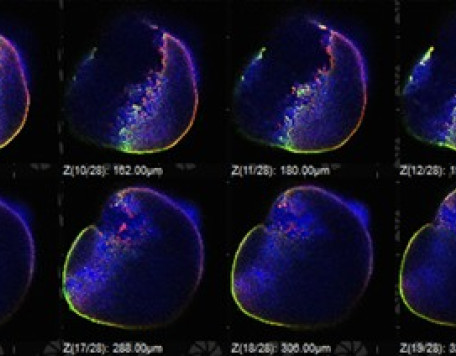© Pint of Science, 2025. All rights reserved.
We all start life at the centre of the womb (-iverse). Can what happens to us in the early stages of development affect how we are now? Researchers at the University of Leeds will lead us deeper into the womb-iverse.
Too much of a sweet thing? Understanding how diabetes in pregnancy impacts birthweight and life-long health of the baby
Dr Karen Forbes
(Lecturer and Group Leader)
Katy Walsh
(Undergraduate Placement Student)
Gestational diabetes (GDM) is characterised by an increased blood sugar level and is the commonest medical condition to adversely affect an otherwise healthy baby’s birth weight. Babies born at extremes of birthweight are at high risk of developing obesity, diabetes and cardiovascular problems before they reach childbearing age. We think that substances in the mother’s blood called extracellular vesicles and microRNAs might be causing changes in birthweight by altering how the placenta functions. We might be able to use these substances to prevent the complications of diabetes in pregnancy.
You are what your parents ate: The very hungry embryo
Dr Paul McKeegan
(Postdoctoral Research Fellow)
It is widely understood that our environment and lifestyles affect different parts of fertility and embryo development, from drinking alcohol to eating fish with high mercury content. Swordfish, anyone? Now, a growing body of research reveals that parental diet can have remarkable effects on fertility and embryo development. My research has focussed on the metabolism during the earliest days of egg cell and embryo development – a sensitive and crucial period that affects development of the foetus, and even adult life.
Throwing a lifeline: could new treatments improve fetal growth?
Dr Lara Morley
(Clinical Research Fellow)
The placenta is every baby’s lifeline. Healthy pregnancy relies on this rich network of blood vessels to supply the baby with oxygen and nutrients. Poorly functioning blood vessels can cause fetal growth restriction (FGR), which affects up to 8% of UK pregnancies. If this goes undetected, the baby is at risk of stillbirth. There are no treatments for placental dysfunction, often resulting in delivering the baby prematurely. Through researching blood vessels from patient samples, identifying potential drug targets will be a major step towards developing new treatments.
Life, the uterus, and everything
Ali Taylor
(Postgraduate Researcher)
Dr Niamh Forde
(University Academic Fellow)
Animals have evolved many different ways to support their offspring during growth and development. From kangaroos carrying their still developing young in their pouch, to humans and livestock species who give birth to fully formed and sometimes very independent offspring. By studying reproduction across many animals, from the platypus, to cows and humans; and by looking at the building blocks of the placenta we can understand how developing mammals are supported and provide valuable information to help with successful pregnancies.
Map data © OpenStreetMap contributors.
Other The Social events
2025-05-21
Neuroscience frontiers: Mini-brains and zapping pain away
The Social
21 Merrion Street, Leeds, LS2 8JG, United Kingdom
2025-05-20
Blurred Boundaries: Where Science, Art, & Music Collide
The Social
21 Merrion Street, Leeds, LS2 8JG, United Kingdom




